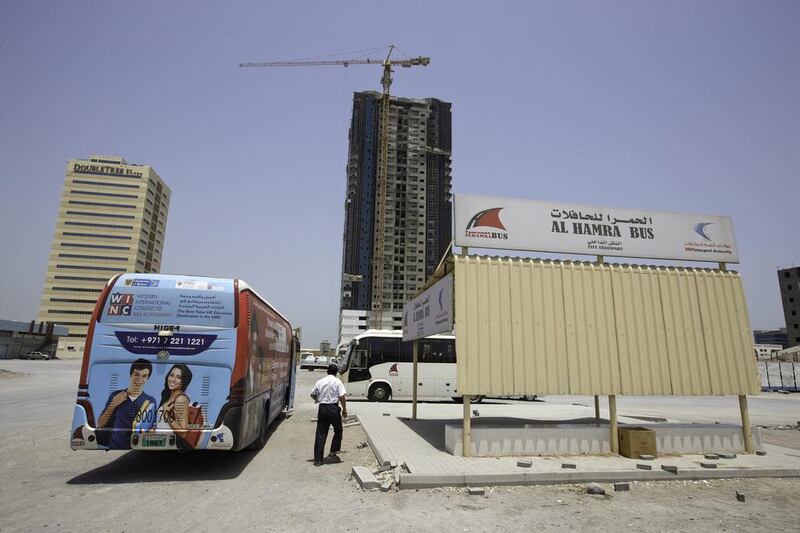RAS AL KHAIMAH // Residents say that bus links in RAK are so bad they are forced to use taxis.
They also say services are erratic, timetables inaccurate and stations are not properly maintained.
About five years ago, plans for a comprehensive public transport system were announced, and the first local bus service was launched in 2011, after years of delay.
But residents in the emirate say the service is extremely limited.
"There are no proper local buses. If it is essential, then we go out – otherwise we remain at home," said Mohammed Rahim, a Pakistani building worker who has lived in the emirate for eight years.
"If I take a taxi to the bus it will cost me Dh20, then a Dh25 fare to Sharjah or Dubai.
"We don't earn that much money to spend on transport."
Mr Rahim said he earned Dh1,050 a month.
The sole bus route, known as Al Hamra route, runs from the south of the emirate to Al Shaam in the north, close to the Omani border.
It stops at places including Cove Rotana, RAK Ceramics, Nakheel in RAK City and the airport.
But half of the emirate's 416,600 population live in rural areas and the route only services certain towns.
Many residents also have to take taxis just to reach the bus stops.
"First I have to take a taxi to reach RAK Ceramics, which costs Dh12. Then I try to catch a bus for downtown Nakheel," said Michael Songo, a Filipino, who earns Dh1,200 a month as a welder in Al Hamra. This is an area near RAK Free Zone, and he also lives nearby.
"If I want to go to other places, I have to hire taxis as buses do not stop at most locations."
The central bus station on the outskirts of RAK City only had timetables for inter-emirate buses. Two other stations in RAK City also lacked local timetables.
The only bus stop in the Nakheel area is in a sandy and deserted area with no proper shelter from the searing summer temperatures.
"If we come to the city from our accommodation we have to cough up about Dh50," said Bangladeshi Mosa Chowdhry, 35, who works in a money exchange and lives in the Digdaga area of RAK City.
"If I suffer due to a lack of local bus services, how do poor labourers manage who earn below Dh1,000?"
Rajendran from India agreed: "Only taxis are an option here. The bus stop in [Nakheel] is in such a pathetic condition – no shade, no proper place to sit. "
Others say that the taxi fares should be reduced because so many people have to use them.
"I took a taxi to the RAK Road and Traffic Academy for light vehicle training from [the central] bus station," said Daniyal Piracha, 20, a Pakistani.
"This cost Dh26, while the return cost me Dh28. I have to cough up this amount due to a lack of buses on that route
"As per the income and resources of RAK residents, the taxi fare should be less as a flagfall of Dh3 here I find very expensive."
Another problem is the condition of bus stops and vehicles.
The restrooms are untidy and unhygienic, said Mr Piracha.
"The condition of city buses is very poor and air-conditioning has deteriorated."
RAK officials did not respond to questions about the situation.
anwar@thenational.ae
Residents complain about limited bus services in Ras Al Khaimah
Many people live in rural areas of Ras Al Khaimah and say the existing service is erratic and does not meet their needs.

Editor's picks
More from the national





